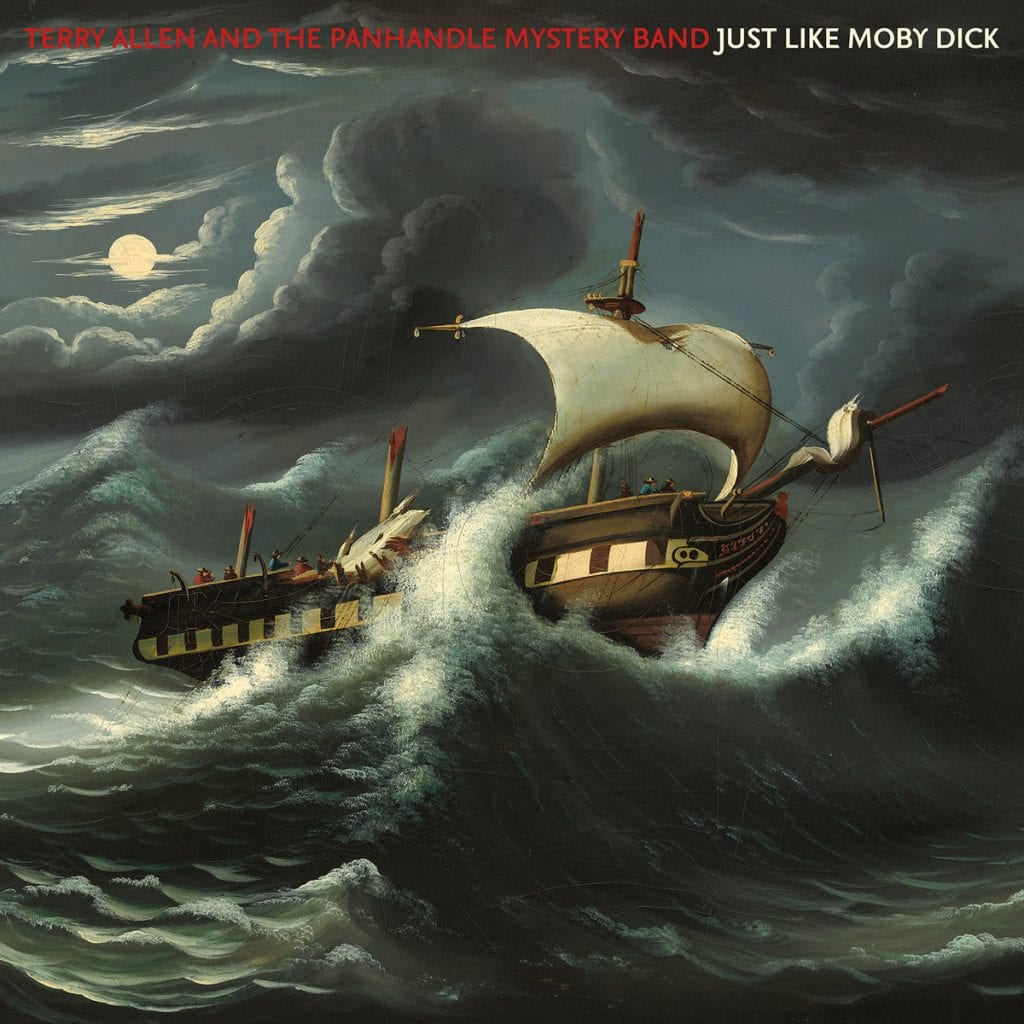A New World Breaks Through on Terry Allen’s ‘Just Like Moby Dick’

In the middle of his “American Childhood” three-song suite, Terry Allen sings with an ominous confidence, “It’s just the war, same fucking war, it’s always been. It never ends.” That stark hopelessness in “Bad Kiss,” the second song in the suite, is hilariously countered with the memory of a public display of affection that was so awful it led this young man to enlist. “Was it that bad,” he sings, “that you had to go?” There are few artists who can sing about blood on the ancient land of Afghanistan in the same breath as a botched smooch, but Allen does so with an unexpected ease.
It’s a gift that is unique to Allen, a Kansas-born, Texas-bred outlaw who, in the span of four years, released two of the most fabled country albums of any decade, 1975’s Juarez and 1979’s Lubbock (On Everything). From the earliest stages of his career, Allen has focused on layering unforgettable music with unexpected satire, soaking it all in revealing truths.
Over the course of five decades, Allen’s work has expanded far beyond the long play as he’s plunged into the world of visual and conceptual art, all the while deepening his use of language to bridge reality with parody, tragedy with comedy, truth with farce.
Though it would be near impossible to claim any one of Allen’s records as his pièce de résistance, his latest album, Just Like Moby Dick — his first original collection since 2013’s Bottom of the World — may vie for that title. The self-professed “sequel” to Lubbock, Just Like Moby Dick is an LP full of stunning music crafted by an inimitable cast of characters that make up The Panhandle Mystery Band: Allen’s wife Jo Harvey, Bukka Allen, Kru Allen, Bale Creek Allen, Charlie Sexton (who co-produced with Terry), Shannon McNally, Lloyd Maines, Richard Bowden, Davis McLarty, Glenn Fukunaga, and Brian Standefer.
Though the title may lead you to think this is a concept album of sorts, with Ishmael taking the reins, Allen only uses the story of the white whale as a guiding siren of sorts. Instead of a voyage on the Pequod, Allen takes his listeners on a journey that covers a lot of ground, from Houdini facing death after life in “Houdini Didn’t Like the Spiritualists” to a town lamenting the loss of its last local dancer in “Death of the Last Stripper.” Allen brings clown-killing vampires into the light on “City of the Vampires” and delivers the storytelling masterpiece “Pirate Jenny,” which serves as a nod to Kurt Weill and Bertolt Brecht’s original of the same name.
But Allen shines like rarely before on the three-part “American Childhood.” In the opening movement, “Civil Defense,” Allen’s narrator urges listeners, “Forget about Jesus, just duck and cover when you see the light,” as he leads them into the unfortunate “Bad Kiss.” The suite concludes with the reversal of one of history’s greatest children’s stories as Allen sings, “Make your body go here, make your body go there. Stripped down naked or maybe underwear, make you do what the good little puppets do. And Geppetto’s nose outgrows Pinocchio’s.”
Author David Dark asserts that apocalyptic speech and imagination “is the place where the future pushes into the present. It’s the breaking in of another dimension, a new wine for which our old wineskins are unprepared.” Allen’s body of work is apocalyptic by the very nature of his words, and Just Like Moby Dick crafts an experience where listeners are welcomed into yet another world of Allen’s design.
“So better break out the bottle, bring on the glass,” he sings at the end of the record, “and fill it up with the good stuff, ’cause everything must pass.” Planet Earth might be unprepared for the good stuff that Terry Allen is offering, but the life-changing reality is his new world is breaking through, whether we’re ready or not.



